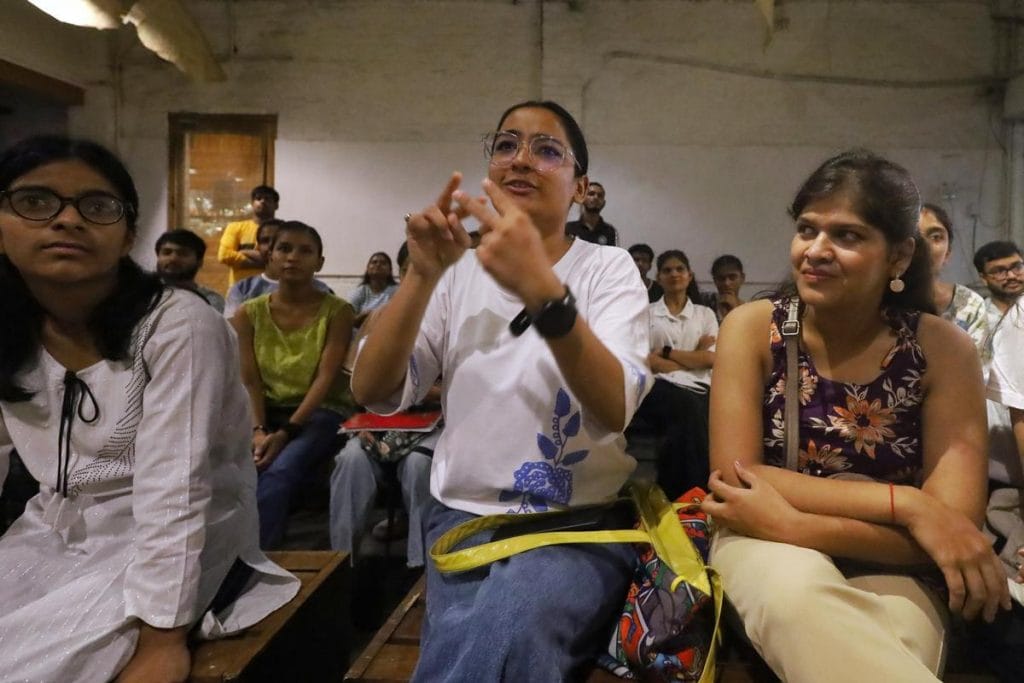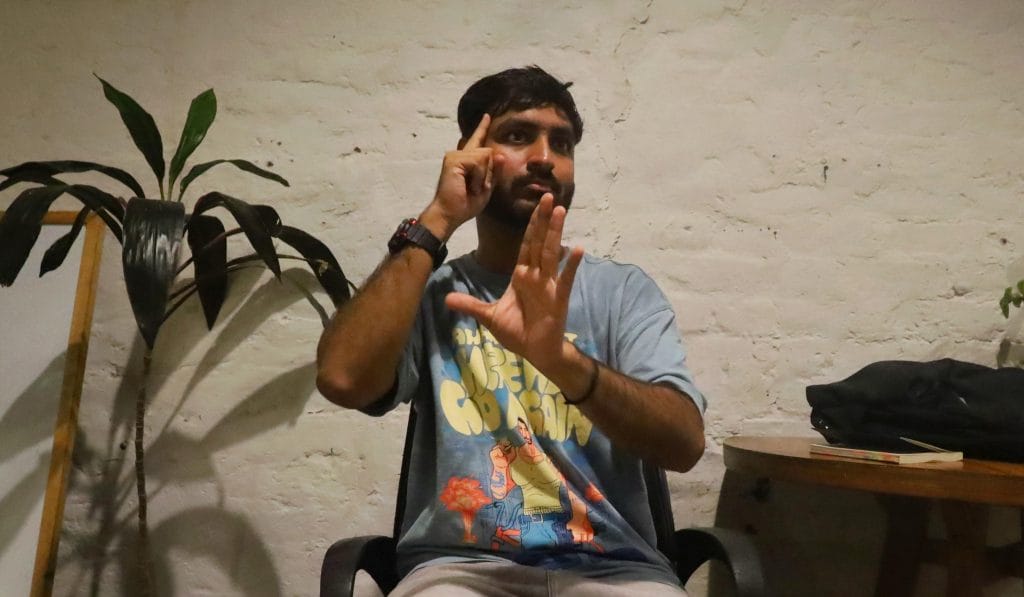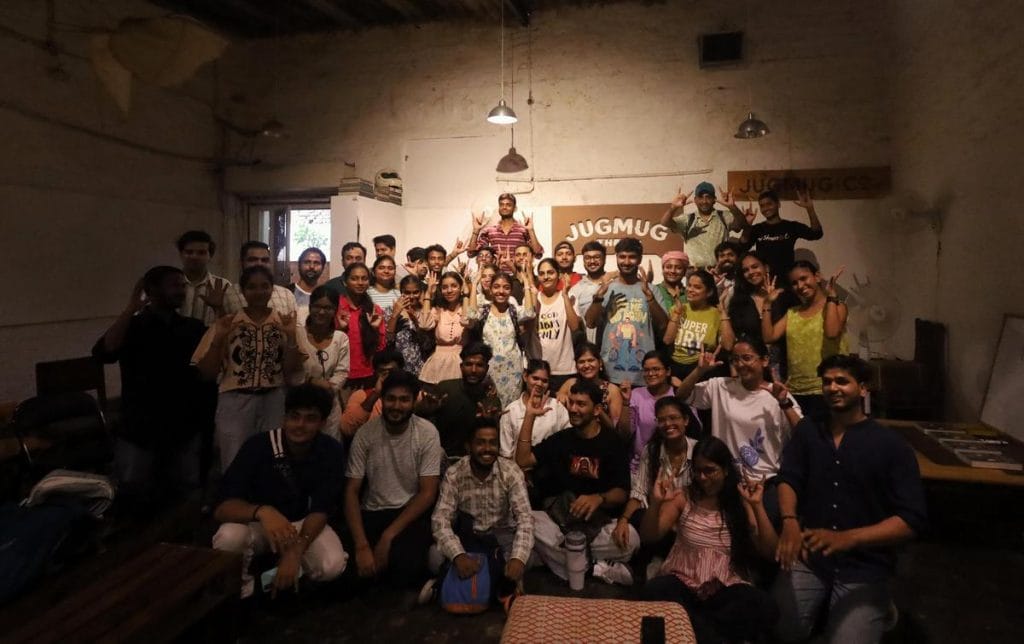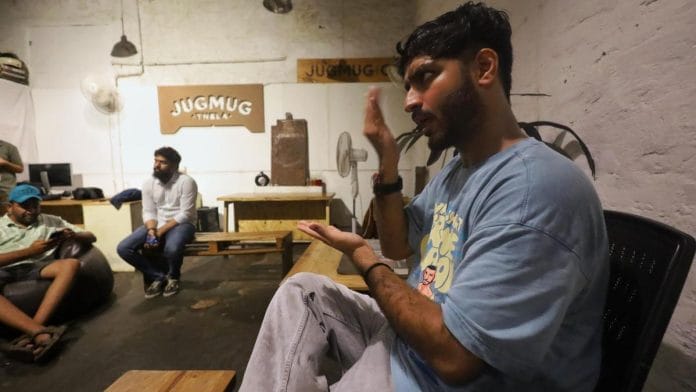New Delhi: The room was silent, but a book discussion was in full swing. Hands moved quickly, fingers shaped arguments and counterpoints. The themes of courage and self-acceptance in the book of poems, Yesterday I Was the Moon by Pakistani author Noor Unnahar, resonated with many of the participants.
This was the latest meetup of Deaf BookWave, a book club for deaf readers. Over 40 people gathered at Jugmug Thela in Delhi’s Champa Gali on Sunday afternoon to discuss life, learn, and share their experiences through the poems. The conversation unfolded entirely in Indian Sign Language (ISL), with three interpreters present to help bridge exchanges between deaf and hearing participants.
Jugmug Thela, a café and performance venue, usually charges for its space, but made an exception this time.
“Deaf BookWave was doing something noble, so we wanted to give it to them for free,” said Gautam Kumar, the venue’s manager.
The book club was started three months ago by 21-year-old Parmeet Singh, who grew up in Delhi and now studies psychology and English literature at Kristu Jayanti College in Bengaluru. It’s one of the first initiatives of its kind in India and has already held six events since April—three in Bengaluru, one in Thiruvananthapuram, and two in Delhi.

He wanted to create the kind of space he never had before.
“A deaf person is always surrounded by people who didn’t learn and make them feel as if they are too much,” said Singh, who loves poetry and romance novels and is a votary of their power to change lives. “I started this club so that deaf people can come and discuss any books. It will help them to reflect upon themselves.”
Also Read: Drains to dating apps—Dalit queer booklet maps Delhi’s unspoken caste geography
Pain, resilience, laughter
As the audience took their places on wooden benches, Parmeet Singh sat at the front of the room, a slim paperback on the table beside him. He began the three-hour session with a short introduction about himself, the club, and why he’d chosen Yesterday I Was the Moon.
“I was confused between three books. Finally I chose this because I thought deaf people can relate to it,” Singh said of the volume by Unnahar, who is also popular on Instagram for her self-reflective verses and artwork.
He had marked out pages with colourful tabs and picked poems to guide the discussion. One of the poems was about emotional overwhelm and self-preservation:
I fled
forgave and forgot
people
for this hurricane in me
could either ruin
all of them
or save
all of me
and I
chose me.
The poem was used to reflect on surviving hard times and to affirm that deaf people experience the same range of emotions as anyone else.

Like Yesterday I Was the Moon, earlier picks at the club have also been written in simple, emotionally direct language. Books like I Don’t Love You Anymore and Warmth by Rithvik Singh have focused on themes of identity, heartbreak, and resilience.
One of the poems from the book prompted a reflection on letting go and starting over:
With every sunset
a new hope is born
an old expectation dies.
Despite the heavy themes, the tone in the room stayed relaxed. There were jokes, meme references, and bursts of laughter. Hands moved in fast open-fingered twists—the ISL sign for applause.
“We learnt ‘rizz’, a Gen Z term that we had no idea about. It was a good learning session,” said participant Jyoti Makhija, giggling along with her friend Preeti Rawat. “We were able to express ourselves without any judgements.”
Also Read: Odia literature was limited to palm leaves. Print became its tool of resistance & revival
‘They do not teach us how to read’
The light-hearted mood took a serious turn for a few minutes when the conversation turned to education. Singh spoke about the flaws in India’s education system for the deaf, and many in the room nodded along.
“Government institutes are not good for deaf people. But we (deaf people) have to learn and make a better place for ourselves,” he said.
Singh has seen these gaps firsthand. He transferred from one school to another in search of better teaching. Most places didn’t offer sign language. Many teachers didn’t pay adequate attention.

“The problem is our education system. Deaf people face difficulty in reading and writing. It is not their fault—we have to blame the schools. They do not teach us how to read. It’s just memorise, copy, and paste,” he told ThePrint.
Even at his current college in Bengaluru, Singh had to push to get a sign language interpreter in class. It’s these gaps that made him passionate about starting a club where deaf people can learn by interacting with each other. He also hopes to use his specialisations in psychology and English literature in service of the community.
The book club was one way to start, but he’s not sure how long he’ll be able to continue running it singlehandedly.
“I am graduating in 2026, and after that I want to make sure I make good use of my degrees,” he said. “I want Deaf BookWave to grow and for hearing people to join and contribute.”
(Edited by Asavari Singh)






